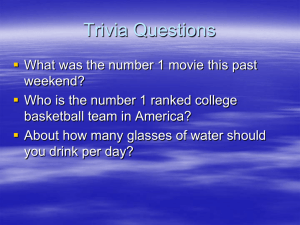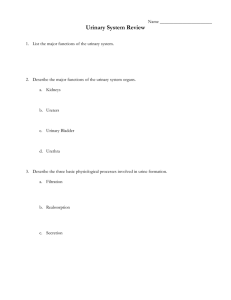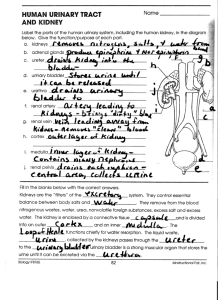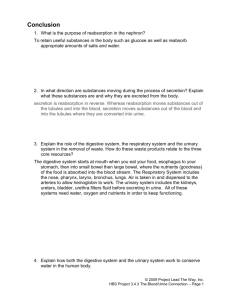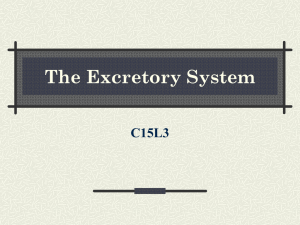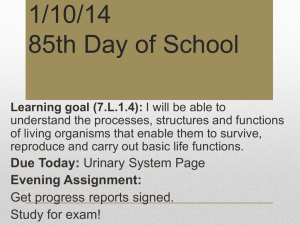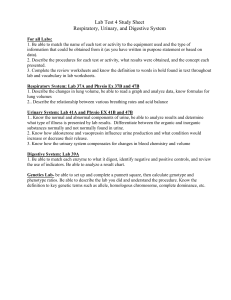By: Franco María Jiménez Iveth Lamboglia Rosa
advertisement
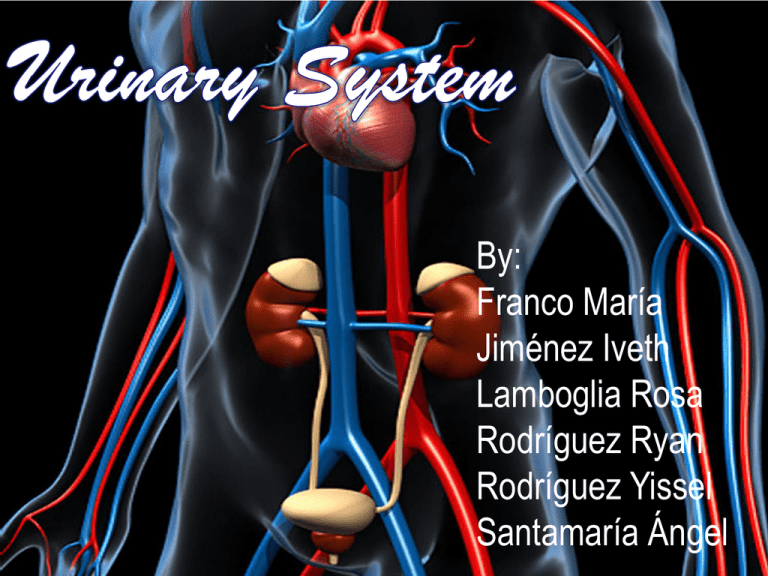
By: Franco María Jiménez Iveth Lamboglia Rosa Rodríguez Ryan Rodríguez Yissel Santamaría Ángel Urinary System Definition Kidneys Basic Unit Organs Ureters Functions Urinary Bladder Diseases of the Kidney Urethra The Urinary System is a group of organs in the body concerned with filtering out excess fluid and other substances from the bloodstream. The substances are filtered out from the body in the form of urine. Organs in the Urinary System Are located at the rear wall of the abdominal cavity. Is a hollow, muscular and elastic organ that sits on the pelvic floor Muscles in the walls of the ureters send the urine in small spurts into the bladder Is a muscular tube that connects the bladder with the outside of the body Basic Unit of the Kidneys Regulate Regulat e blood pH water and soluble substances by filtering the blood Control levels of electrolytes and metabolites Nephrons Eliminate wastes from the body Regulate blood volume and pressure Basic Unit of the Kidneys Its function Each nephron • Are vital to life and are regulated by hormones such as antidiuretic hormone, aldosterone, and parathyroid hormone • Is composed of an initial filtering component (the renal corpuscle) and a tubule specialized for reabsorption and secretion (the renal tubule). process of excretion water balance maintain normal ph of the blood manitain the homeostasis chemical balance Filtration • Blood enters the afferent arteriole and flows into the glomerulus. • Nonfilterable blood components include blood cells and platelets along with plasma proteins. Reabsorption • This reabsorption process allows water (H2O) to pass from the glomerular filtrate back into the circulatory system Secretion • Some substances are removed from blood through the peritubular capillary • Urine is a collection of substances that have not been reabsorbed during glomerular filtration or tubular reabsorbtion. Maintaining Water-Salt Balance Reabsorption of water Reabsorption of Salt Hypernatremia Diuretics Exercised by the anti-diuretic hormone (ADH) ADH causes the insertion of water channels Without ADH, little water is reabsorbed Reabsorption of Salt 1-ADH helping to dilute bodily fluids 2-Aldosterone promotes the excretion of potassium ions Hypernatremia 1-Increase in plasma sodium levels above normal Diuretics 1-Is any drug that elevates the rate of bodily urine excretion Kidney stones is the term commonly used to refer to stones, or calculi, in the urinary system. Stones form in the kidneys and may be found anywhere in the urinary system. Prostatitis is inflammation of the prostate gland that results in urinary frequency and urgency, burning or painful urination, a condition called dysuria, and pain in the lower back and genital area Urinary tract infections (UTIs) are caused by bacteria in the urinary tract. Urinary incontinence, loss of bladder control, is the involuntary passage of urine. Urinary retention, or bladder-emptying problems, is a common urological problem with many possible causes. Normally, urination can be initiated voluntarily and the bladder empties completely Proteinuria is the presence of abnormal amounts of protein in the urine.
